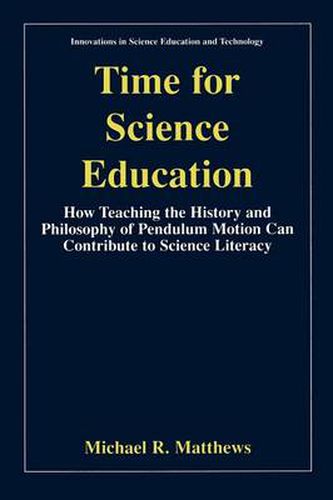Readings Newsletter
Become a Readings Member to make your shopping experience even easier.
Sign in or sign up for free!
You’re not far away from qualifying for FREE standard shipping within Australia
You’ve qualified for FREE standard shipping within Australia
The cart is loading…






This title is printed to order. This book may have been self-published. If so, we cannot guarantee the quality of the content. In the main most books will have gone through the editing process however some may not. We therefore suggest that you be aware of this before ordering this book. If in doubt check either the author or publisher’s details as we are unable to accept any returns unless they are faulty. Please contact us if you have any questions.
This volume demonstrates the importance of history and philosophy of science for science education. It provides a case study of the pendulum, showing the pivotal role played by the pendulum in the Scientific Revolution. It describes how the pendulum enabled the creation of accurate clocks that, among other things, enabled the long-standing problem of longitude to be solved. The book charts how the solution of the longitude problem was of enormous social, economic and cultural significance for European and consequently world history. Further, the book shows how the discovery of the laws of pendulum motion by Galileo, Huygens and Newton hinged on the acceptance of a new methodology for science. The pendulum laws are a window through which to view the fascinating mixture of experiment, mathematics and philosophy that characterized the foundations of modern science, the Galilean-Newtonian paradigm, and distinguished it from Aristotelian, medieval and commonsense science. The book defends a liberal, or contextual, approach to the teaching of science. It shows how understanding the scientific, philosophical and cultural contexts and ramifications of the pendulum laws can allow teachers to plan more engaging lessons, and conduct informative historical-investigative experiments. Students can re-live history. Contextual understanding of the pendulum allows connections to be made with other parts of the science curriculum, and with other subject areas such as geography, literature, religion, music and mathematics. Readers should come away with a deeper understanding of the nature of science and its role in history.
$9.00 standard shipping within Australia
FREE standard shipping within Australia for orders over $100.00
Express & International shipping calculated at checkout
This title is printed to order. This book may have been self-published. If so, we cannot guarantee the quality of the content. In the main most books will have gone through the editing process however some may not. We therefore suggest that you be aware of this before ordering this book. If in doubt check either the author or publisher’s details as we are unable to accept any returns unless they are faulty. Please contact us if you have any questions.
This volume demonstrates the importance of history and philosophy of science for science education. It provides a case study of the pendulum, showing the pivotal role played by the pendulum in the Scientific Revolution. It describes how the pendulum enabled the creation of accurate clocks that, among other things, enabled the long-standing problem of longitude to be solved. The book charts how the solution of the longitude problem was of enormous social, economic and cultural significance for European and consequently world history. Further, the book shows how the discovery of the laws of pendulum motion by Galileo, Huygens and Newton hinged on the acceptance of a new methodology for science. The pendulum laws are a window through which to view the fascinating mixture of experiment, mathematics and philosophy that characterized the foundations of modern science, the Galilean-Newtonian paradigm, and distinguished it from Aristotelian, medieval and commonsense science. The book defends a liberal, or contextual, approach to the teaching of science. It shows how understanding the scientific, philosophical and cultural contexts and ramifications of the pendulum laws can allow teachers to plan more engaging lessons, and conduct informative historical-investigative experiments. Students can re-live history. Contextual understanding of the pendulum allows connections to be made with other parts of the science curriculum, and with other subject areas such as geography, literature, religion, music and mathematics. Readers should come away with a deeper understanding of the nature of science and its role in history.